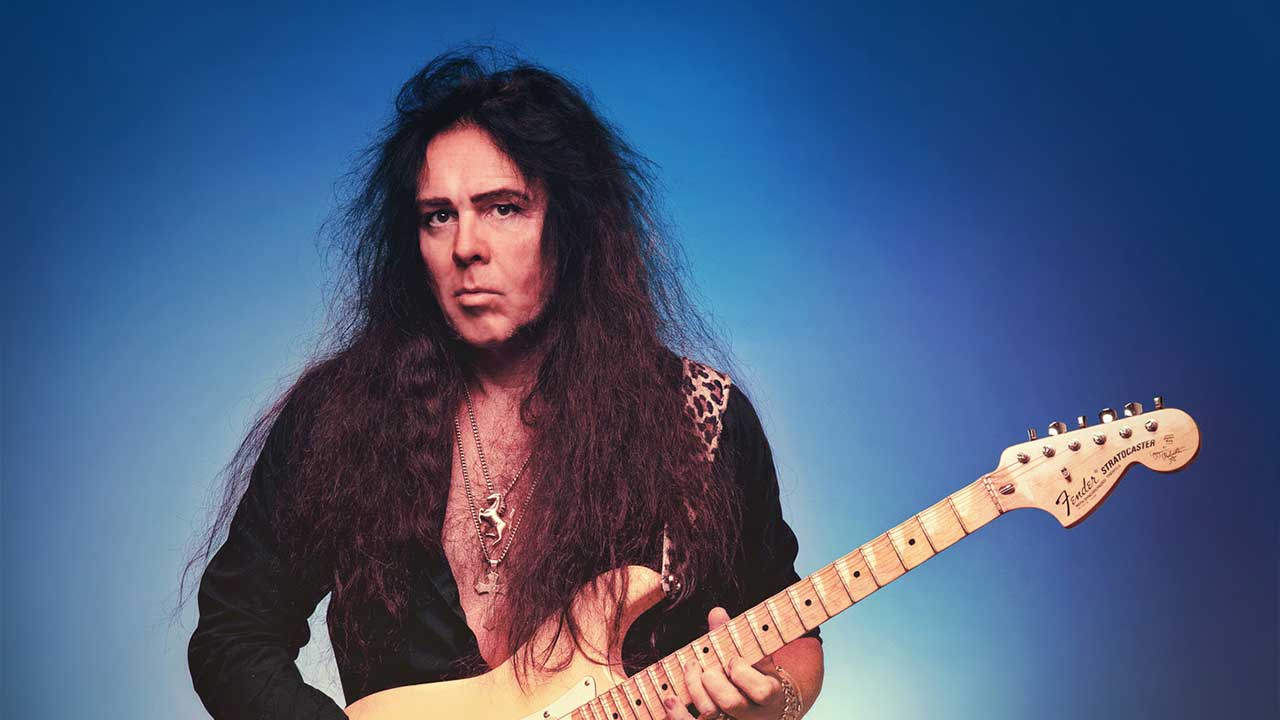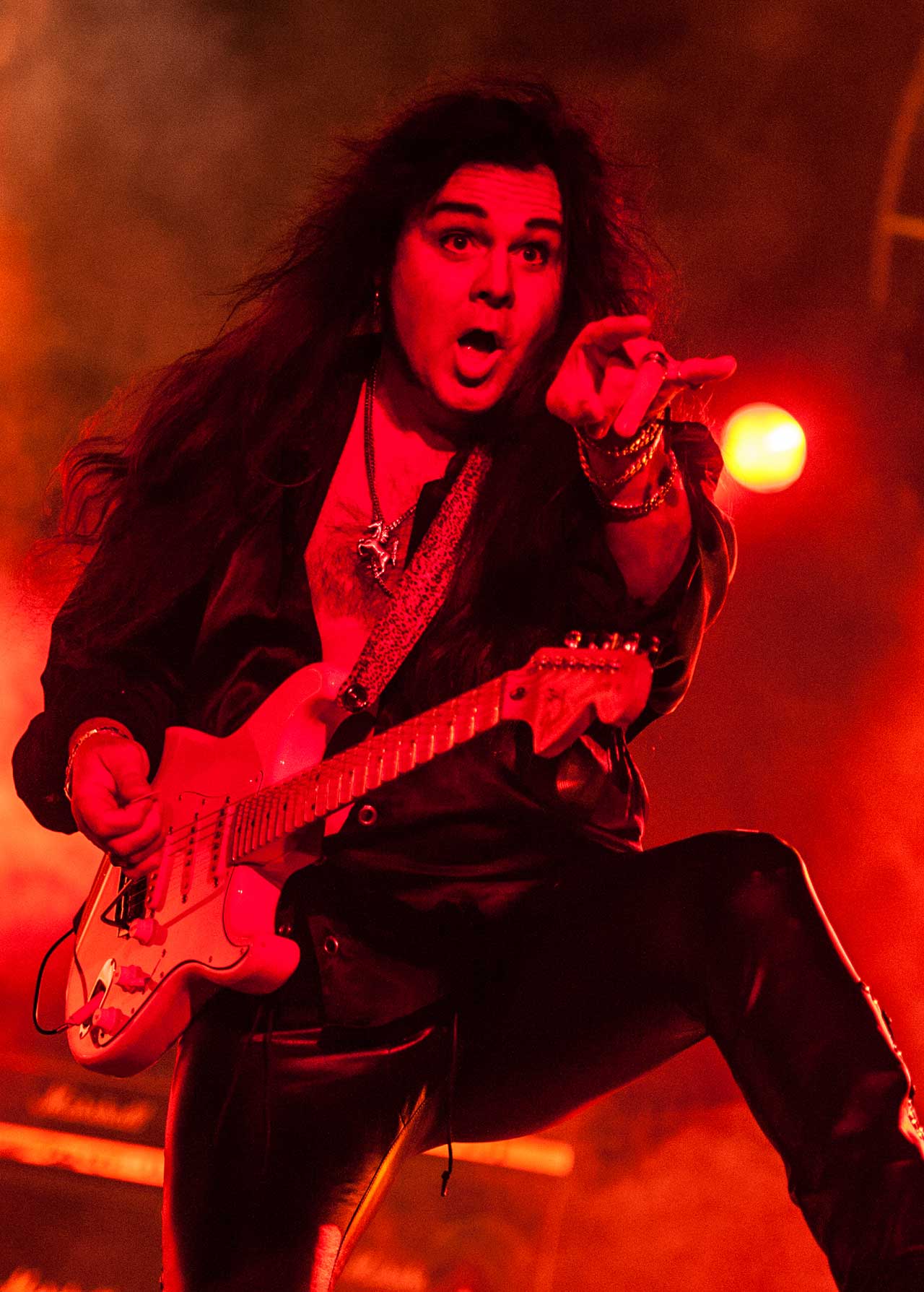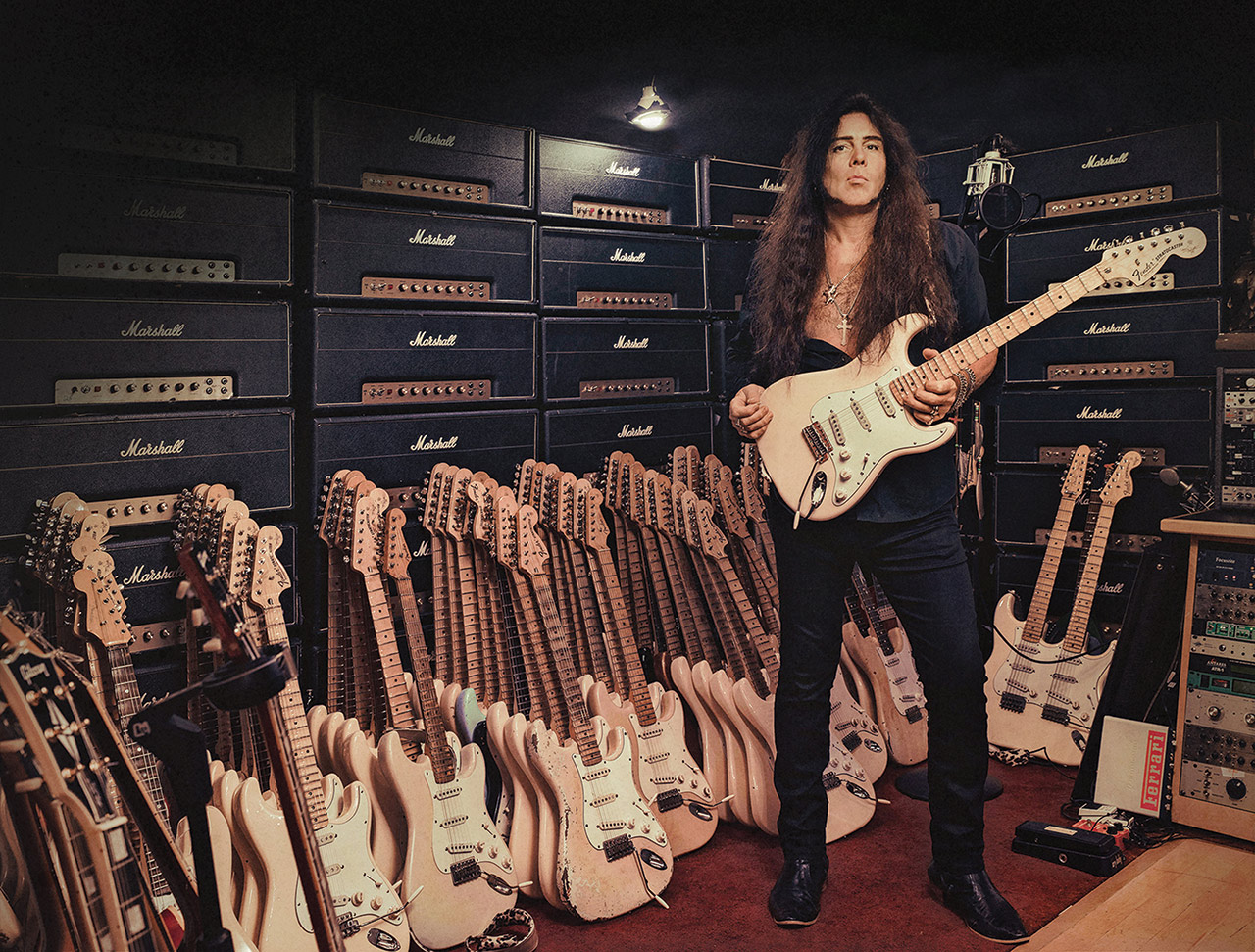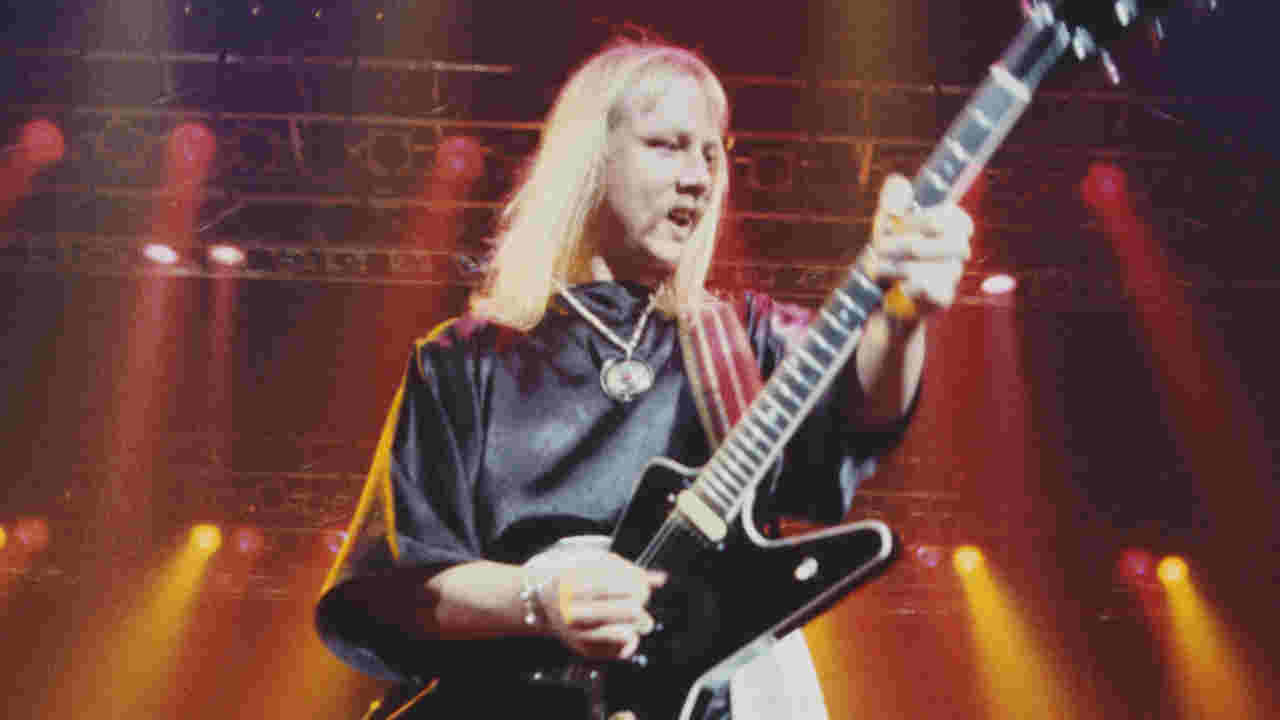Yngwie Malmsteen: a career faster than the speed of light
He’s the Swedish speed demon whose six-string theatrics enthral and infuriate in equal measure. Now, Yngwie Malmsteen has made… wait for it… a blues album

“I’ve been in joints like this before,” Yngwie Malmsteen says as he settles into his cell. The posh Soho hotel where rock’s premier neo-classical speed demon greets Classic Rock is, it turns out, a former courthouse once visited unwillingly by Oscar Wilde, Mick Jagger, Keith Richards and John Lennon; a painting of the latter on the wall looms over the guitarist’s shoulder.
Even Wilde might have thought twice about Malmsteen’s entrance into the place’s now chic lobby. With his crow’s-nest hair, long leather jacket, leather trousers and black shirt open to the waist, he looks like Gene Simmons crossed with Elvis. Metal bracelets jangle when he raises his hand and peers over mirror shades to make a point.
Tall, with the comfortable build of the King circa 1973, he also recalls Presley in a southern softness to his accent, its Swedishness now burnt out by 30 years living in Miami.
The charges levelled against the cell’s temporary new occupant are minor but long-standing: he has riled his detractors by the blizzards of notes which have blown through his records since he arrived in the US in 1982, and sent bandmates spare by dictating every sound they make. ‘So what?’ he’ll shrug. ‘Ever heard of Beethoven?’ He’ll similarly contend he’s no mere shredder (despite helping to popularise guitar playing as an Olympic speed trial), instead launching the playing of his instrument into new realms of classical range and technique.
A TV glimpse of Jimi Hendrix burning his guitar at Monterey was one formative influence on Malmsteen the Stockholm child prodigy. Niccolò Paganini, the nineteenth century violinist whose fiery flights led to Robert Johnson-like rumours of supping with Satan, mattered more.
Malmsteen’s 1998 album Concerto Suite For Electric Guitar And Orchestra is his self-declared pinnacle. And the DVD of its live debut with the New Japan Philharmonic shows him in his element: a florid frock-coated soloist in a concert hall, eyes squeezed shut, fingers flying up and down the frets as dozens of musicians faithfully play his mutant magnum opus.
The fervent Deep Purple fan was both developing Jon Lord’s concept for their Concerto For Group And Orchestra and merging his classical upbringing with his metal maturity. Although it’s sometimes absurd, and Beethoven needn’t roll over, his serious joy in work he totally believes in is a pleasure to watch.
Sign up below to get the latest from Classic Rock, plus exclusive special offers, direct to your inbox!

Malmsteen’s new album, Blue Lightning, is by contrast a blues album (suggested by his label, Mascot), with new songs alongside covers both highly familiar (Smoke On The Water, Purple Haze, Paint It Black) and left-field (Eric Clapton’s Forever Man).
What makes this more surprising is his characteristically blunt opinion on the blues a decade back. “My whole approach to guitar playing,” he told journalist Steven Rosen in 2008, “was to remove myself from that incest of the blues mentality… I don’t want to have anything to do with blues, which is the most limited, the most pathetic kind of music… It’s like staying in first gear in a Ferrari. I don’t want to do a whole blues album.”
“Yeah, it’s a great thing that you brought that up,” he raps back. “I know that I used to be quite outspoken in a lot of different ways, and sometimes I take it back. But this time I want to explain what I meant.” And so he does, at length and at breathless speed much like his playing.
As he traces his unusually difficult relationship with the blues, he also tells the origin story of Yngwie Malmsteen the respectable Swede who gave it all up to play lightning-fast rock’n’roll as if it was a symphony.
“I grew up in a classically trained family – opera singers and pianists and violinists,” he says of his childhood. Aged five he was learning piano, flute, trumpet, drums and “classical rudimentary whatever”, until that glimpse of Jimi flamboyantly destroying his flaming guitar on a news item the day of his death (September 18, 1970) made seven-year-old Yngwie pull an acoustic guitar he’d been gifted from the wall. “Nobody taught me, I played what sounded like a bluesy thing. “
Then I heard Deep Purple’s Fireball when I was eight. That was an extension of the blues again, because Deep Purple, let’s not be mistaken, was a blues band. And I was so fanatical about my guitar-playing that I would play fifteen hours a day when I was seven. I mean, I could play anything – ‘diddle-e-diddle-ee-diddle-ee’ [imitating his infantschool shredding].”
I used to be quite outspoken in a lot of different ways, and sometimes I take it back
Yngwie Malmsteen
The point of Malmsteen’s story today is that he was playing the five-note pentatonic scale that all blues is built from. “Then I heard Genesis’s Selling England By The Pound, and that freaked me out. And I also heard [its non-pentatonic, inverted notes] in my mother’s Bach and Vivaldi records. Then I saw Paganini’s 24 Caprice No. 5 on TV, and it stirred me. But have you heard of a ten-year-old kid who wants to play classical things on the electric guitar? No. So why would I do that? Because I like the challenge. And I had some weird idea that it was what I was meant to do.”
As for his old dismissal of the genre he’s just made an album in, he only half takes it back.
“What I meant was that I revolted against the pentatonic box, which every guitar player you can name is in – Hendrix, Keith Richards, Michael Schenker, Van Halen. And Blue Lightning isn’t all pentatonic. So I stand by that.
“I think it was a harsh statement,” he adds of his blues diatribe. “But I’d like to point out that I admire Buddy Guy, I admire BB King. A lot of blues players, I love them. AC/DC's Angus Young is a blues player, and he’s a fucking good one, because he really means everything he does. ZZ Top’s Billy Gibbons – come on! I love these guys! I really love them! I just have to say that’s not where I’m going.”
Unlike those hard-line bluesmen and rockers, though, Malmsteen’s roots are European, and classical. So did blues seem kind of dumb? “
‘Dumb’ is the wrong word. Because I hear BB King play one note, and that one note has more meaning than fucking… I don’t even know how to explain it. I get chills just thinking about it. I don’t want to call that dumb. For instance, when I play on stage every night I play Albinoni’s Adagio In G. That’s a classical piece. But I play it with a feeling of blues. So is blues an expression, or is it the pentatonic scale? I think it’s an expression. So I don’t think ‘dumb’ is a good word. ‘Limited’ is.”

If Malmsteen’s feelings about blues seem to be the most tortured of any major guitarist, wait until you hear him on his homeland. To many, Sweden is an enviable egalitarian utopia, symbolised by ABBA’s sunny optimism. The nation’s most revered rock instrumentalist begs to differ
“Growing up in Sweden in the seventies was a very bare thing,” he says. “There was no external input at all; there was only one TV station, there was only one music radio station, there was a record store, a music store, and your friends at school. No one knew what was going on. I liked Deep Purple, but no one told me what Rainbow was. You had to have a lot of internal imagination. And no one was telling me what to do and what not to do. Or maybe they did and I wasn’t listening properly.”
The Cold War with Sweden’s near neighbour Russia required his dad – an irregular presence since divorcing when Yngwie was a baby – to become, his son discovered later, a “007”, spying on the Soviets. Young Yngwie, meanwhile exaggerated his natural intransigence to be declared unfit for national service, claiming he’d turn the army’s guns on himself. No, it wasn’t the threat of World War III which made Yngwie mad. It was how fucking fair everything was. ‘I’m a genius, he seethed – get me out of here.’
“I was very un-Swedish then, and I’m un-Swedish now,” he explains. “I didn’t fit in at all with the mentality that no one’s better than anyone else. If everyone’s the same, there would be no art.”
Art class was one battleground.
“My uncle was an illustrator, and when I was younger I was very talented at drawing,” he says. “But the teacher would go: [adopting a Muppets Swedish chef accent] ‘Let Lars and Anders do the drawing, because everybody is the same.’ And their drawing was like a stick man, and mine was really fucking out-there, Salvador Dali shit. There’s this word in Swedish that doesn’t exist in any other language – lagom – that means ‘not too much, not too little’. My mentality is more is ‘More!’ And I’ve always been like that.”
Adolescent Yngwie drove his motorbike into school, got into fights for telling classmates they were idiots, and favoured playing guitar over attending at all. And yet his long-suffering school was a model of supportive sympathy.
“I was treated really well,” he concedes, “because they would let me have a key for the woodwork studio so I could go in there and file out frets and shit on my guitar. They were really nice, actually. And I did have straight As in everything, although I didn’t even go.”
Spells with a luthier and a classical conservatoire saw him to the end of compulsory education. What a nightmare it all sounds.

Landing in the USA in 1982 to realise his rock dreams, 18-year-old Malmsteen found his promised land.
“It was California, so there’s no classical music, and they don’t read [music],” he says. “But it was more upbeat. I felt much more like I belonged. I later learned that they’d say in schools: ‘You could grow up to be president of the United States.’ In Sweden we were basically told: ‘Stay in your place, and shut the fuck up.’”
Unsurprisingly, Donald Trump is Malmsteen’s kind of President. The economic achievements he reels off might benefit from fact-checking, but putting America first makes “perfect sense”, the guitarist believes. The president also does exactly what he wants, paying little attention to pesky rules or even his own party. This would surely be President Malmsteen’s approach?
“Ha ha, yeah…” he muses of being the main man in the White House. “The thing is that Congress has almost equal power, and if I were to get to a position like that I would have to work with that. But that’s why I probably wouldn’t do that sort of thing. Actually, I can’t,” he remembers, “because I wasn’t born there.”
I was so fanatical about my guitar playing that I would play fifteen hours a day, when I was seven
Yngwie Malmsteen
Along with Swedish society, school and democratic checks, Malmsteen also doesn’t dig being in bands where anyone but him has a say. Although he was backed by a regular line-up of his band Rising Force during the 80s, as time went on drummers would find their kit tuned, and every beat weighed and planned by their boss in the studio, as if the musicians were just notes on a score. Lead singers such as former Rainbow frontman Joe Lynn Turner were let go one by one. Now, on Blue Lightning Malmsteen sings and plays everything himself.
“Some bands wouldn’t really function without each other, like Led Zeppelin, and that’s awesome,” he considers. “I was never like that. Even as a student I was thought of as an egomaniac. Which even if I might be, that’s not why I work that way. I do so because I have no confusion about what I want.”
He views other musicians not as bandmates but employees, paid to play his music, and regrets his early weakness in letting singers write their lyrics. “Other guitar-players that hire singers, like Schenker and Blackmore, just let them sing whatever the hell they want,” he reflects. “But then it’s not my full message. And that’s very important to me.”
And yet so much great music has been created from the mysterious sparks and magic of musicians being together in a room. Has Malmsteen really never got anything from collaboration?
“The weirdest thing is that I have to really sit here and think about that,” he says.
There have been pleasant times with his peers, like his three tours since 2016 with Steve Vai’s guitar supergroup Generation Axe, which also features Zakk Wylde, Extreme’s Nuno Bettencourt and Animals As Leaders’ Tosin Abasi. “We hang out on the bus,” he says, “and it’s a really great feeling.” Participating in Vai’s arrangement of Bohemian Rhapsody last year as part of this “guitar orchestra” was “an interesting test of discipline”.
Malmsteen finally can think of just one musician who told him something he didn’t know: Cozy Powell, one of his “heroes of all time”, who he “drew maps” to make his own drummers sound like, played on his 1997 album Facing The Animal. “Cozy told me: ‘You have to have two ballads on the album.’ And the only time I’ve ever listened to anybody was Cozy.”
It makes you wonder how he managed when he was first invited to America after demos for Swedish CBS found their way on to Californian college radio, leading to him joining Ron Keel’s metal band Steeler for their self-titled 1983 debut. Malmsteen then switched to British singer Graham Bonnet’s band Alcatrazz, shortly after Bonnet had been ousted from the Michael Schenker Group. Even straight off the plane aged 18 and in a strange land, Malmsteen confesses he couldn’t hide his frustration in these other people’s bands.
“Steeler was Ron Keel’s band, a hundred per cent,” he explains. “And it was my ticket to the United States. I figured I can make an album, and he let me play whatever the fuck I want.”
Malmsteen’s live debut with Steeler, on March 3, 1983 attracted 30 people to LA’s Country Club. A week later, word of mouth brought many more to their gig at the Troubadour. Soon, ‘Yngwie Is God’ graffiti spread.
“I remember we played some shithole in Long Beach, and Phil Mogg came, and he said: ‘Hey, I’m putting together UFO again.’”
Malmsteen was offered the guitarist spot with both UFO and Bonnet on the same day.
“So I called Graham from Phil’s house and said: ‘Okay, I’ll join your band. Couple of things. Get a new drummer…’ And this thing which was supposed to be Graham Bonnet’s thing became my thing. It started a lot of frustration with the other guys. It was supposed to be me as part of a band, but it ended up not being that.”
Alcatrazz’s success in Japan led to Malmsteen signing a solo deal there. “So my Rising Force record was recorded one year after I came to America.” It hit the US Top 60, and his compromising days were done.
Asked if he ever doubts himself, he pauses, as if flummoxed by the thought. “I debate with myself: ‘Would this be the right thing, or not?’ But I’d say most of the time I’m pretty clear.”
At the height of his American success, in June 1987 he ploughed his Jaguar into a tree. “I had a brain haemorrhage, and it fucked up some of the nerve endings, which resulted in my right hand not being able to move properly,” he told Rock Scene soon afterwards. Around the same time, his mother died. When he woke from his coma, physically shattered and unable to play, surely even he paused to doubt?
“When I first came out of the coma I was all drugged up, so I didn’t think about anything. I was kind of laughing. But there were times, of course. The worst part was my mother passing. And on top of that I was ripped off with all my money, and my house. But I think that’s a test. It was definitely the darkest time. And I often think back to that when something doesn’t go my way – if I can fucking go through that, I can go through anything. That was maybe the worst ever.”
So was his only reaction at that desperate time to plough on?
“Absolutely. Hanging it up never entered my mind. It was, okay, fucking crunch time. How I was going to do it was a different thing. Basically the way I looked at it is I’m not dead. So obviously there were some doubts. But I’m pretty determined. When it comes to something that’s an obstacle, I just crash right through it. Because failure’s unacceptable.”
After his hand had healed, he practised even more. His biggest US hit, Odyssey, followed in 1988.
He is clearly not like other people. And as he explains his indomitable nature, and lists all the privileges and support his highly artistic family and loathed Swedish system gave him in his formative years, I’m reminded of interviewing another rock star for Classic Rock. Kid Rock, too, was a likeable guy, who was raised, I discovered when I visited Romeo, Michigan, in an idyllic village. Like Malmsteen, he was a rebel in paradise, seemingly impatient with less fortunate souls who couldn’t help but fail.
Malmsteen does, though, readily acknowledge where he’s living these days. “Miami doesn’t seem like a paradise, it is!” he exclaims. “As soon as I get home I just go play tennis, and take the [convertible] top down in January, no problem.”
He’s also self-aware enough to concede that there were some advantages to isolated, winter-dark Sweden. “One time I was telling my son Antonio how much I love Miami. And he goes: ‘Yeah, but if you grew up here you probably wouldn’t end up where you are.’ He’s probably right. Because I would be on the beach, not working in a cold studio. So in the end it was useful.”
Europe, other Swedish rockers who made it out in the 80s, are these days revered in their home town of Upplands Väsby. As with so many things, though, Malmsteen’s relationship to his roots is less simple.
“Umm… I don’t really get back there very often.” He pauses. “It doesn’t feel like home. I’ve been away thirty-seven years. I suppose they have put a ‘legendary’ status on me there, for some reason. But I don’t really think twice about that stuff.”
He slips into something he is comfortable with: being a shameless, happy, classic rock star. “I drive round in my Ferrari with my top down and baseball cap on and no shirt, and I don’t try to look like nothing,” he says. “And they know who I am anyway. It doesn’t matter the fuck if it’s Sweden or America. Before, if I went round the States, it would be: [hick voice] ‘Hey, are you in Bon Jovi?’ Now it’s: ‘Hey, you’re Yngwie Malmsteen.’
Nick Hasted writes about film, music, books and comics for Classic Rock, The Independent, Uncut, Jazzwise and The Arts Desk. He has published three books: The Dark Story of Eminem (2002), You Really Got Me: The Story of The Kinks (2011), and Jack White: How He Built An Empire From The Blues (2016).

